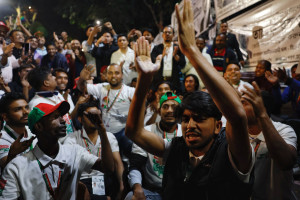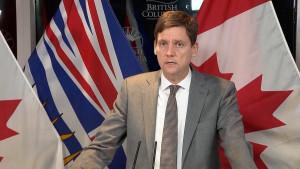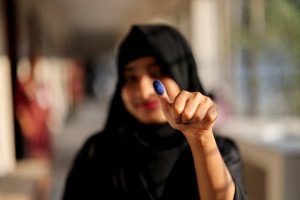World
Back again
There are many reasons why Deuba will be much more than a footnote in Nepal’s political history
Deepak Thapa
The show has finally come to an end. I mean the one in which the Nepali Congress (NC) managed to free itself from stewardship by the Koirala clan. In its 66 years of existence, a non-Koirala has headed the party for only a third of the time and that includes the 16 years Krishna Prasad Bhattarai served as Acting President, with the shadow of Girija Prasad Koirala looming large in the background. By being the first besides the Koiralas and the founding fathers to head the country’s oldest party, Sher Bahadur Deuba has definitely made history, and one can only wish him the best.
Actually, it can be argued that Deuba’s place in the history books was assured a long time ago—not least for enjoying the dubious distinction of being sacked twice by the same king. On the other hand, by being a key player in two acts of an episode, howsoever unsavoury for him personally, he had unwittingly ensured the end of the monarchy.
Unlike his colourless predecessor Sushil Koirala, Deuba is an interesting phenomenon to observe. Let us start at the very beginning. When he first came into the national limelight following the grand success of the NC in the Far-West in the 1991 election, he used to be known as Sher Bahadur Deupa. Thus, he was known throughout the years he served as home minister in Girija’s first government. And, when the name change happened around the time of his marriage, he inexplicably blamed the press for getting his name wrong. I guess to prove his point further, for many years thereafter, foreign media outlets continued to refer to him as Deupa.
Mixed record
Deuba’s first tenure in 1995-1997 was not without drama. He was the one who rehabilitated the votaries of the Panchayat system by bringing their party, the Rastriya Prajatantra Party (RPP), as a coalition partner to muster the parliamentary votes required to be elected prime minister. He proved a determined operator when, unsure of their loyalty, he sent five of the serving RPP ministers to Bangkok for ‘medical treatment’ on the eve of a no-confidence vote in December 1996.
Unfortunately, his undoing came a few months later when two MPs from his own party failed to show up during another test of parliamentary strength. And, who can forget the public outcry over the ‘Pajero kanda’, when his government allowed MPs and ranking government officials duty-free import of vehicles? Or, the fact that rather than take any note of the Maoist threat to begin an armed uprising,
he took off on a jaunt to India?
After the NC came back to power in 1999, it was Deuba who was tasked with leading the government-appointed body to find ways to resolve the Maoist conflict. As luck would have it, that government of Krishna Prasad Bhattarai was ousted by Girija but that did not prevent Deuba and the Maoists becoming increasingly chummy to the extent that in the period preceding the palace massacre in June 2001 and Girija’s resignation the next month, the Maoists had all but declared that they wanted Deuba back as prime minister so that talks could begin.
Not surprisingly, when Deuba took over in July, a mutual ceasefire was declared. It was then that he introduced certain reforms in an attempt to undercut the Maoist message, such as implementing land reforms, outlawing untouchability, and setting up the Dalit and Women’s Commissions. Although the impact of these measures has been mixed at best, it is something he has not stopped crowing about.
Once the fighting resumed in November 2001, Deuba felt a sense of betrayal by the Maoists and unleashed the full might of the state against the insurgents, including introducing the anti-terrorist ordinance. It was the fight to convert the ordinance into an act that ultimately deepened the fissure within the NC and the party split into two but not before Deuba had asked the king to dissolve Parliament. Deuba was riding high at that time and confidently postponed the parliamentary election due in November 2002. Seemingly always on the lookout for a toehold to take power into his own hands, King Gyanendra charged him with being ‘incompetent’ to hold elections and dismissed him. This tag of incompetence haunted Deuba for years. To be fair on him, the king had simply said Deuba had been unable to hold elections.
But, everyone began using the term in the sense that the king had alluded to his qualities as a prime minister in general.
When the agitation against the king began, Deuba found himself a political pariah with Girija unwilling to have any truck with him. It was not until his reappointment as prime minister in 2004 and subsequent sacking some months later that he was allowed into the political front that had coalesced around an anti-king platform.
Deuba had his revenge against Gyanendra when the Seven-Party Alliance his party had joined succeeded in toppling the monarchy once and for all. It is for all these reasons that there is no doubt Deuba will be much more than a footnote in Nepal’s political history.
Darling of the West
A consistent feature of the media’s description of Sher Bahadur Deuba has been that he is close to the West. It is well known that the American ambassador of the time had played matchmaker to the former home minister and rising NC stalwart in 1994. But that can hardly serve as evidence of personal proclivities. Thanks to Wikileaks, however, it is easy to learn more in detail how Deuba is viewed at least by the Americans.
In the cable dated June 2, 2004, the day before he took office for the third time, the US Embassy noted: ‘Friendly to the U.S., Deuba was a vocal supporter of the global war on terror. His government may be expected to press for continued, if not increased, U.S. assistance to address the Maoist insurgency. He staunchly supports a western approach to the economy and favors U.S. investment in Nepal.’
For his backing of George Bush’s ‘War on Terror’, which preceded the end of the 2001 ceasefire by the Maoists (and whom elements in his own government tried unsuccessfully to link to Al-Qaida), and presumably his own links within the US foreign service community, Deuba was even allowed an opportunity to briefly meet Bush in Washington. US military assistance also rose from nearly zero to nearly $30 million to aid Nepal’s own ‘war on terror’.
It is also worth noting how keen Deuba appears to please. On October 10, 2002, the embassy cable states: ‘In response to a request by the ambassador for a meeting with him, ex-Prime Minister Sher Bahadur Deuba appeared at the ambassador’s residence and spent an hour describing the circumstances leading to the dismissal of his government on October 4 by King Gyanendra.’ Turns out it is not only the embassy at Lainchaur that can summon our politicians at will.
Man of history
The strange part of these cables is how personal those can be with arguably uncalled-for details included. For instance, the 2004 one ends a bio-note of Deuba with: ‘Despite his proficiency in English, an apparent speech impediment makes Deuba difficult to understand in any language.’ In any case, that clearly did not prevent him from making himself understood to the rank and file across the country. We will have to see if the man himself will live up to the promise he made after his victory: ‘I have no other interest. I have been elected president to unify the party and develop the country.’
In 2001, soon after Deuba’s accession to the prime minister’s office for the second time, his wife, Arzu Rana Deuba, said in an interview: ‘He wants to be a man of history.’ That part at least is certain. QED.




 10.12°C Kathmandu
10.12°C Kathmandu










.JPG&w=300&height=200)




